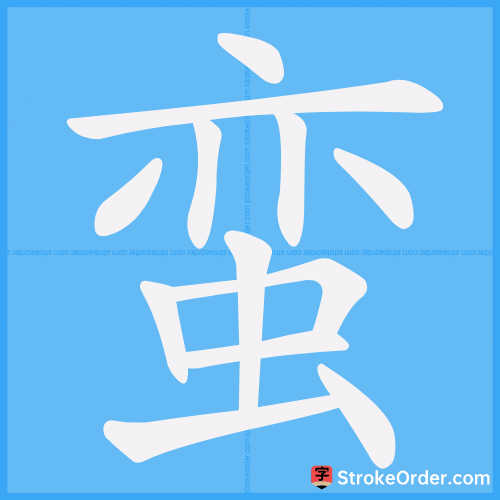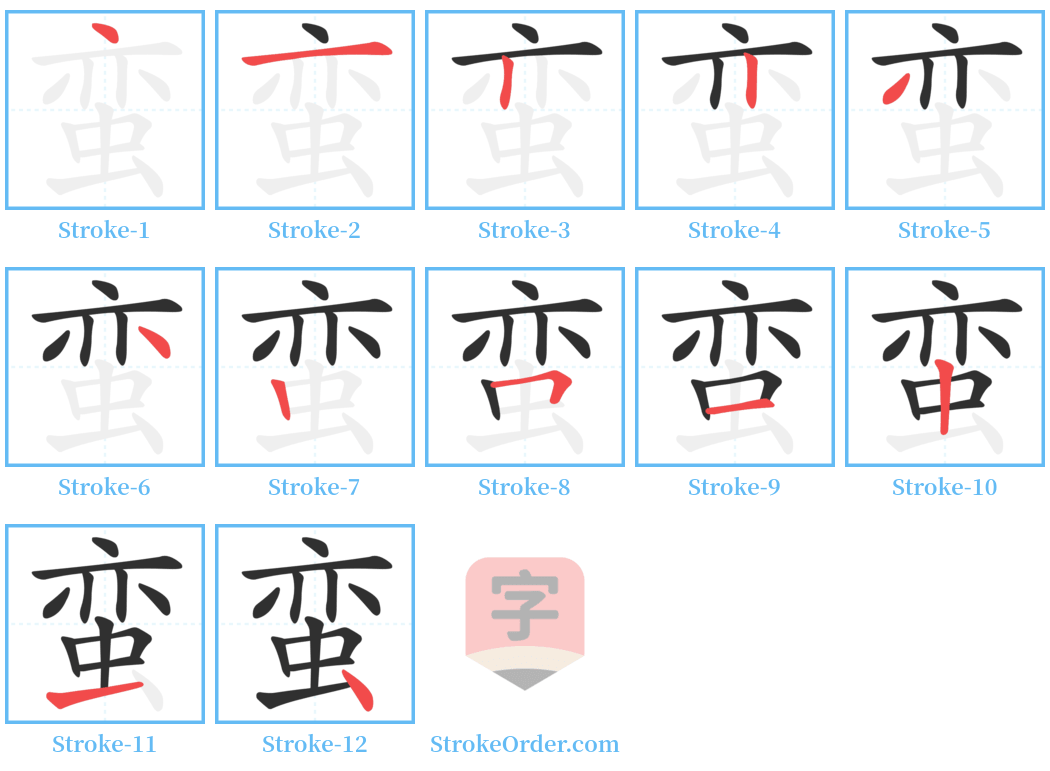蛮 Stroke Order
Animated Stroke Order of 蛮

Stroke Order Diagrams for 蛮

Step-by-Step Handwriting Guide for 蛮

Learn to Write Chinese Characters with Video Tutorials
Watch the video of writing the Chinese character "蛮", learn the correct stroke order (笔顺) of the character "蛮", and master the standard way of writing the character "蛮".
Free Printable Handwriting Practice with Stroke Order: 蛮
Printable Writing Practice Worksheet of "蛮" in Portrait Orientation (Tian Zi Ge)

Printable Writing Practice Worksheet of "蛮" in Landscape Orientation (Tian Zi Ge)

Information of 蛮
Pinyin
mán
Radical
虫
Strokes
12 strokes
Usage
★★★★★
Definition
barbarian / bullying / very / quite / rough / reckless
蛮
mán
1. 粗野,凶恶,不通情理。
Rough, fierce, and unreasonable.
2. 愣,强悍。
Stubborn and tough.
3. 中国古代称南方各族。
In ancient China, a general term for the southern ethnic groups.
4. 方言,相当于“很”。
A dialect equivalent to "very."
蛮
mán
1. 粗野,没开化 (英:fierce; reckless; rough)。
Rough and uncivilized.
2. 对奴婢的贱称 (英:slaves)。
A derogatory term for slaves.
蛮
mán
1. 【本义】: 中国古代对南方各族的泛称。旧时也用以泛指四方的少数民族。
[Original Meaning]: A general term in ancient China for southern ethnic groups, previously used to refer to various minority ethnicities.
2. 【造字法】: 形声。
[Character Formation]: Phono-semantic compound.
3. 同本义 (英:Man nationalities)。
Same as the original meaning.
引证:
1. 《说文》:蛮,南蛮也。
"Shuowen": Man refers to the southern barbarians.
2. 《周礼·大司马》:蛮畿。
"Zhouli": Refers to Man territories.
3. 《周礼·职方氏》:蛮服。又,四夷、八蛮、七闽、九貉、五戎、六狄之人民。
Refers to the clothing of the Man; also applies to the peoples of the Four Barbarians, Eight Man, Seven Min, Nine Hu, Five Rong, and Six Di.
4. 《尔雅·释地》:九夷、八狄、七戎、六蛮谓之四海。
"Erya": The Nine Yi, Eight Di, Seven Rong, and Six Man are referred to as the Four Seas.
5. 《诗·小雅·采芑》:蛮荆来威。
"Shijing": The Man's power comes from the southern regions.
6. 《国语·周语》:蛮夷要服。
"Guoyu": The barbarians and outsiders should be subdued.
7. 杜甫《闷》:瘴疠浮三蜀,风云暗百蛮。
Du Fu: The miasma hovers over the Three Shus, while wind and cloud darken the Hundred Man.
8. 例如: 蛮声哈剌(南方叽哩呱拉的声音);蛮人(指南方人);蛮布(蛮人所织的布);蛮风(指南方蛮地的风;蛮地的风情习俗,引申为粗野的风俗);蛮烟(南方蛮地的瘴烟)
Examples: Man voice (chaotic sounds from the South); Man people (referring to southern people); Man cloth (fabric woven by the Man); Man wind (the customs and habits of the southern barbarians, extended to mean rough customs); Man miasma (the miasma of the southern regions).
蛮
mán
1. 例:如:蛮法(不讲理的样子);蛮话(横蛮的话);蛮气(粗犷悍勇的风气);蛮性子(脾气粗暴);蛮不讲理(横蛮不讲道理)
Examples: Man law (unreasonable behavior); Man speech (rude words); Man spirit (rough and fierce atmosphere); Man temper (violent temperament); Not talking reason (extremely unreasonable).
蛮
mán
1. 方言,相当于“很”:如:蛮好;蛮有意思;蛮有趣
Dialect equivalent to "very": e.g., Quite good; quite interesting; very fun.
barbarian / slave servant / (old) contemptuous term for people from southern China (used by northern Chinese people)
to act rashly / to act precipitously regardless of the consequences / reckless / foolhardy / daredevil
Input Method for 蛮
Pinyin
man2
Wubi
yoju
Cangjie
yclmi
Zhengma
ski
Four Corner
00136
Unicode
U+86ee
Same Pronunciation Characters